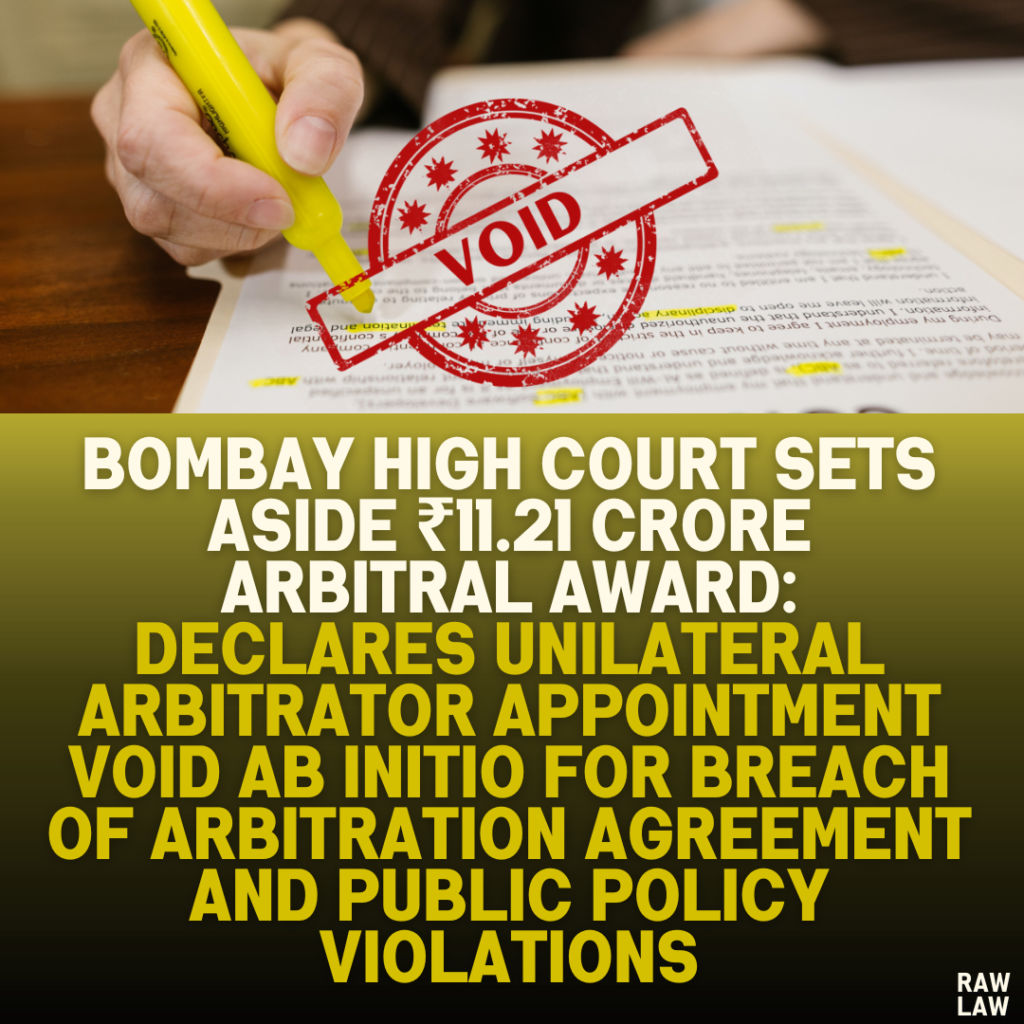Court’s Decision
The Bombay High Court, presided over by Justice Somasekhar Sundaresan, ruled that the arbitral award of ₹11.21 crore granted by a unilaterally appointed arbitrator was invalid. The court found that the appointment was made in violation of both the arbitration agreement and the Arbitration and Conciliation Act, 1996 (the Act). It held that the unilateral appointment undermined the principles of impartiality and party autonomy, rendering the award void ab initio.
Facts
- Original Work Orders: Pratibha Industries Limited (PIL), now undergoing liquidation, was awarded two work orders by the Public Health Engineering Department, Government of Rajasthan.
- Subcontract Work: PIL subcontracted portions of this work to the petitioner. The respondent claimed to have facilitated this subcontract and alleged entitlement to a facilitation fee under a Memorandum of Understanding (MOU) executed in January 2019.
- Dispute Over the MOU:
- The respondent asserted that the MOU outlined a facilitation fee based on a percentage of the project value.
- The petitioner denied executing the MOU, labeling it as forged and against public policy (a bribe for contract facilitation).
- A First Information Report (FIR) was filed by the petitioner alleging forgery.
- Arbitration Initiated:
- On July 2, 2021, the respondent invoked arbitration and unilaterally appointed Mr. A. Jagannathan as the sole arbitrator.
- The petitioner objected to this appointment, citing a lack of mutual consent.
- Proceedings Despite Objections:
- The arbitrator proceeded with the hearings despite the petitioner’s repeated objections and refusal to participate.
- An award of ₹11.21 crore, along with interest, was made in favor of the respondent.
Issues
- Was the unilateral appointment of the arbitrator valid under the arbitration agreement and the Act?
- Did the arbitrator’s award suffer from patent illegality and violation of public policy?
- Could the petitioner challenge the award under Section 34 of the Act despite not approaching the court under Section 11?
Petitioner’s Arguments
- Invalid Appointment: The petitioner argued that the unilateral appointment violated the arbitration agreement and the Act.
- Forged MOU: The petitioner contested the validity of the MOU, asserting that it was fabricated and designed to claim bribes disguised as facilitation fees.
- Public Policy: Any contract that promotes illegality or involves bribes is against public policy and unenforceable.
- Patent Illegality: The arbitration proceedings and award were vitiated by patent illegality due to procedural defects and lack of mutual consent.
Respondent’s Arguments
- Failure to Object in Time: The respondent contended that the petitioner did not file a formal challenge under Section 16 of the Act or seek court intervention under Section 11.
- Estoppel: The petitioner, by engaging with the arbitrator on some occasions, forfeited its right to object later.
- Valid Arbitration: The respondent claimed the arbitration process adhered to the principles of the Act.
Analysis of the Law
- Party Autonomy: The court highlighted the centrality of party autonomy in arbitration. Consent of both parties to the appointment of the arbitrator is foundational to the validity of arbitration proceedings.
- Clause 7 of the MOU:
- Even if the MOU was valid, it did not authorize unilateral appointment of an arbitrator.
- Arbitration was to be conducted per the Act, which mandates mutual agreement or court intervention for appointing arbitrators.
- Unilateral Appointment Invalid:
- The court relied on Central Organisation for Railway Electrification v. ECI-SPIC SMO MCML (JV) to underline that unilateral appointments undermine the principles of independence, impartiality, and fairness.
- Section 16 of the Act: While the Act permits arbitrators to rule on their own jurisdiction, the arbitrator in this case failed to address fundamental objections regarding unilateral appointment and lack of consent.
- Public Policy:
- Contracts promoting illegal activities, such as bribes, contravene public policy and are unenforceable under Section 34(2)(b)(ii) of the Act.
- The award, being based on such a contract, could not withstand judicial scrutiny.
Precedent Analysis
- Central Organisation for Railway Electrification v. ECI-SPIC SMO MCML (JV): The Supreme Court held that unilateral appointments are invalid as they compromise the fairness and impartiality of arbitration.
Court’s Reasoning
- Void Ab Initio: The unilateral appointment of the arbitrator was void from the outset as it violated the arbitration agreement and the Act.
- No Estoppel Against Law: The court rejected the respondent’s argument that the petitioner’s partial participation barred it from challenging the award. Jurisdictional defects cannot be waived or conferred through conduct.
- Patent Illegality: The award suffered from:
- Procedural irregularities (lack of mutual consent and adherence to arbitration rules).
- Violation of public policy (based on a disputed MOU alleged to involve bribes).
Conclusion
The court set aside the award under Sections 34(2)(a)(v), 34(2)(b)(ii), and 34(2-A) of the Act. It ruled that the arbitration proceedings and award were vitiated by procedural and substantive illegalities. The court did not impose costs on either party.
Implications
- This judgment reinforces the importance of mutual consent and adherence to procedural safeguards in arbitration.
- It underscores that contracts contravening public policy are unenforceable.
- It highlights the necessity of court intervention under Section 11 when mutual consent for arbitrator appointment is absent.
